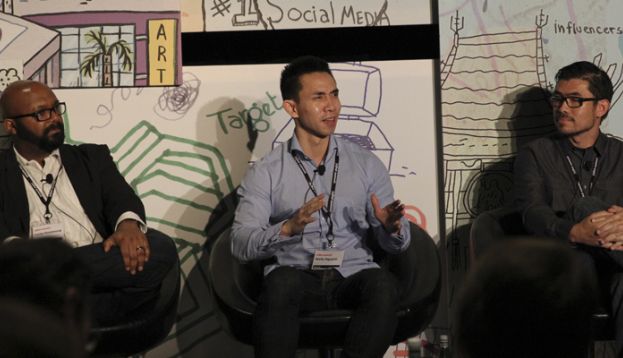Mike Vorhaus, president of Magid Advisors, moderated a panel about monetizing mobile. He was joined by panelists Corey Rosemond, business development director for Plantronics; Wally Nguyen, CEO of mNectar; Austin Murray, founder and chief business officer of TextPlus; and Vincent Juarez, principal and director of media for Ayzenberg.
Mike Vorhaus led off the panel by asking the panel to consider the role of games on mobile in the future, given that games are currently responsible for the overwhelming majority of mobile revenue. “Will games continue to be the dominant monetization in mobile ,” Vorhaus asked. “We get a lot of people approaching us to put games in our application,” said Murray, a veteran of the mobile gaming space before starting up his messaging app company. “You see games being put into messaging apps around the world. I’m not sure if it’s going to stay that way, or it’s just the low-hanging fruit right now. People are coming up with new ways to monetize them.”
“Games are certainly the most sexy part of mobile right now,” Juarez noted. “The burden is on developers to get people to cross that velvet rope to monetize.” An interesting perspective was brought by Nguyen, a self-confessed gaming fanatic. “I look at it from a consumer perspective. If you look at the East, the apps are built as multi-use,” Nguyen said. “There’s chat, messaging, there are games built in, and that’s how Easterners enjoy their experience. As Americans we like to have a specific app for each purpose. The Eastern method allows for higher LTV and ARPU, because it’s a long term relationship. The Western approach, when you’re done with Candy Crush you’re done with the relationship.”
“We have seen that free-to-play can benefit the end user, because it creates this bond between the developer and the end user,” said Rosemond. “That’s not something you always found with traditional products.”
Vorhaus asked the panel about the prospects for console games to benefit from mobile games, and vice versa. “The way to look at console games migrating to mobile is at core gaming,” said Nguyen. “There are some challenges, like retention – early retention is really tough with core games. You can’t just drop in and understand it. If they stick around until day 30, you can really make money from them.”
Other panelists had more optimistic views. “You could see it as a gateway to the console experience,” said Juarez. “You want to give them a bite-sized snack, but you want to do it in a way that allows them to migrate over.” Rosemond noted the popularity of companion apps to console games. “I think about mobile giving more value to the consumers without having to give up your revenue stream. Companion apps are a good example of that,” Rosemond said. “They enhance your ability to do things within the game.”
Talking about CPI and acquiring audience, Vorhaus noted that in many Asian countries, paid TV advertising is actually the number one source of installs for apps. Nguyen was much more direct in his response. “CPI is dead, CPI sucks, you should not buy on the basis of CPI,” Nguyen declared. “Why are people installing your app You don’t know, but that’s what you pay for. In a given month, people install ten apps, and at the end of the month they delete nine. Nine out of ten CPI campaigns are therefore wasted. I think product demonstration is the best way to go.”

